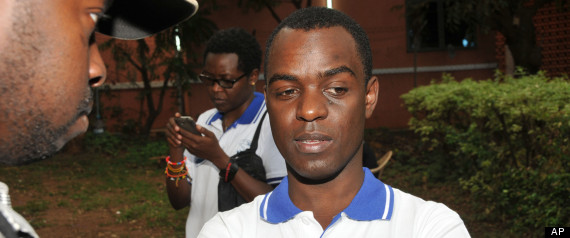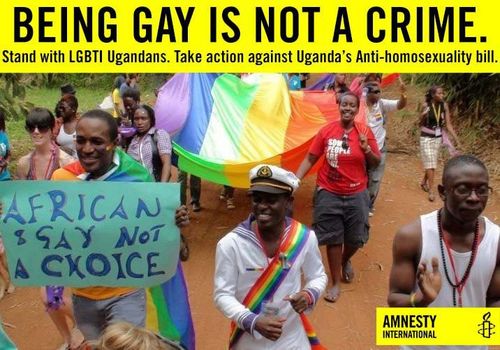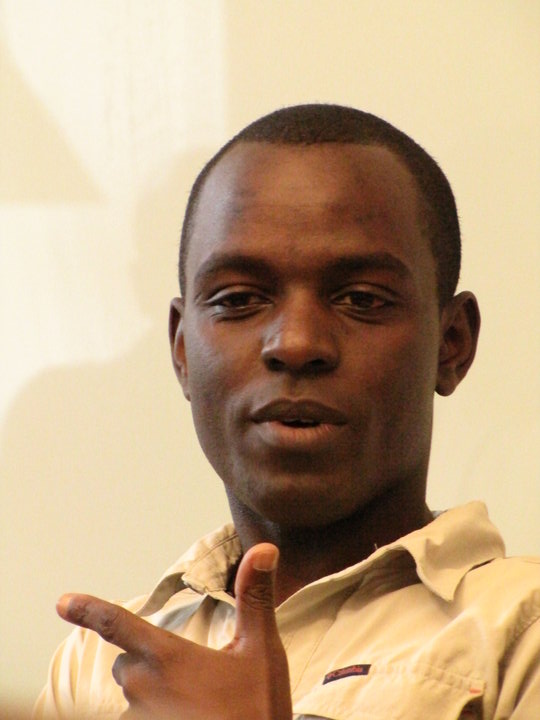Frank Mugisha, Ugandan Gay Activist:
-
If Anti-Gay Bill Passes, I'd Be 'Sentenced To Death'

Frank Mugisha
“If the law is passed the way it is right now, I would go to jail, and I would be killed,” said Ugandan gay activist Frank Mugisha, speaking from Kampala last week, regarding the newly-revived bill known as the “kill the gays” bill, which could punish homosexuality, which is already illegal in Uganda, with life in prison or death. “The bill says anyone who commits the offense [and speaks out] against this legislation more than once is a serial offender. And the fact that I’ve already said in Uganda that I’m gay, and that I’m an advocate for LGBT rights, that means I’m promoting homosexuality in Uganda, according to this bill. This legislation, if passed into law, it would automatically make me a serial offender and I would be sentenced to death.” (Listen to the full interview below)
Mugisha disputes those in the government in Uganda, and those among antigay leaders in the U.S., who say the death penalty provision has been removed from the bill.
“This legislation is very draconian and there have been rumors that [the death penalty provision] was removed,” he said in an interview on my SiriusXM OutQ program, about the bill which the speaker of the parliament promised as a Christmas “gift” to the nation and could be voted on any day. “[But] the committee said they have completed their report, and the committee cannot change the legislation. What they can do is, they can only make recommendations in their report. So right now we are talking about legislation that has the death penalty. As of right now Parliament has never received any new or different or water-down legislation. Any recommendations [for revision] can be refused or accepted by parliament.”
Mugisha worries about his safety and that of all LGBT Ugandans, as well as their families and friends if the bill is passed. The law would subject even those who know LGBT people to arrest and imprisonment if they protect LGBT people in any way.
“I’m worried about my own safety but not as much as I’m worried about other LGBT people in Uganda,” he said. “I know people in Uganda who are going to suffer a lot of intimidation, blackmail and extortion, people who could be killed if this legislation is passed. Once the legislation is passed the Ugandan public is going to become very hostile toward LGBT people, and my face, being very openly gay – in Uganda, people know where I live. They know where I hang out. People know my whereabouts, so I become an easy target for any kind of violence.”
Though some U.S. LGBT activists have called upon the Obama administration to make public statements and take stronger public action, Mugisha believes the U.S. is applying a lot of pressure.
“I’m very confident that the U.S. government and other governments are doing everything possible to see that this legislation doesn’t pass,” he said. “And I’d like to assure people in the U.S. that the American government is doing all they can to talk with my government.”
But Mugisha implored people to keep up the pressure.
“We need petitions signed,” he said. “We need letters written to members of parliament. We need peaceful demonstrations at our diplomatic missions. We need people engaging with all Ugandans.”
-
Uganda's Anti-Gay Bill Won't Contain Death Penalty: Report
KAMPALA, Uganda – The Ugandan lawmaker who originally authored an anti-gay bill proposing death for some homosexual acts said Friday that a new version of the proposed legislation doesn't contain the death penalty.
Parliamentarian David Bahati said the bill, which is expected to be voted on next month, had "moved away from the death penalty after considering all the issues that have been raised."
"There is no death penalty," he told The Associated Press.
Bahati said the bill now focuses on protecting children from gay pornography, banning gay marriage, counseling gays, as well as punishing those who promote gay culture. Jail terms are prescribed for various offenses, he said, offering no details. The most recent version of the bill hasn't been publicly released.
In 2009, when Bahati first introduced the bill, he charged that homosexuals threatened family values in Uganda and that gays from the West were recruiting poor Ugandan children into gay lifestyles with promises of money and a better life. He said a tough new law was needed because a colonial-era law against sodomy was not strong enough.
The bill, popular among many in Uganda but condemned abroad, has been under scrutiny by a committee whose members now say they are ready to put it forward for a vote. One of the members, Krispus Ayena, said Friday that some parliamentarians spoke strongly against certain provisions in the bill as well as the death penalty itself.
"There was a dissenting voice in the committee," Ayena said. "They argued very forcefully that we should not do a thing like that: to regulate what goes on in bedrooms. First of all, is it practicable to regulate that? And there are those who say this is very oppressive."
The bill's original wording proposed the death penalty for cases where HIV-infected homosexuals had sex, where gay people had sex with minors or the disabled, and where gays were discovered having sex for the second time. Bahati said at the time that these offenses amounted to what he called "aggravated homosexuality."
The speaker of Uganda's parliament recently said the bill would be passed before Christmas, renewing fears among activists who want it jettisoned. The bill has been condemned by some world leaders, including U.S. President Barack Obama, who has described it as "odious." European countries such as Sweden and Norway have threatened to cut foreign aid to Uganda if the bill becomes law.
More than 445,000 people around the world have joined a campaign urging Citibank and Barclays to publicly condemn the bill. Both Citibank and Barclays have big operations in Uganda. The petition – perhaps mistakenly, according to the latest information from Bahati and Ayena – calls the legislation the "Kill the Gays" bill.
"As world banks and heavy players in Uganda, Citibank and Barclays have a unique responsibility to speak out and help stop this dangerous legislation before it becomes law," said Citibank customer Collin Burton, who launched his campaign on Change.org. "Now, perhaps more than ever before, we need the international business community to step up and lead by the corporate values they tout on their websites. Human lives are counting on it."
Ugandan gay activists, while condemning the bill, point out that it has somehow helped the struggle for equality by pushing a once-taboo subject to the national agenda. This year Ugandan gays held their first pride parade.
-
I do hope they cut the funding, if you ever seen documentaries about the country it's abominable, a mix of pure and utter stupidity and hate
-
Help fight Uganda's Anti-Homosexuality Bill

Let's stand with these brave and beautiful people, and speak as loudly in support of them.
Go to Amnesty International's action page and sign the appeal:
hxxp://amnesty.org/en/appeals-for-action/uganda-anti-homosexuality-billStop the Anti-Homosexuality Bill in Uganda!
-
I had signed several petitions already but IMHO you can never sign too many for a Good Cause :cheers:
:thx: Dax for this addition to this thread.
-
Let's say bears they are now where we were a couple of centuries ago.
On a general note a mole who observed the mankind from underground couldn't avoid to notice a certain incoordination between very structured you/I and a dispersed, destructured, broken we. Some social insects species could seem much more efficient since in those dictatorships the dictator generally asks only to be well-nourished in exchange for the continuity of the society itself without useless frills or illogical sacrifices.
If we had to stand only to the you/me I happen to think even if I was straight I would have individually some problems to kick the chair under the feet of such a cutie pie :drool: but sadly when we come to the we other things may happen :pope:

